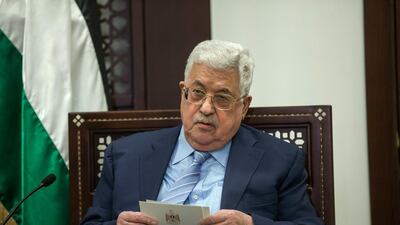Palestinian president Mahmoud Abbas will travel to the United Nations headquarters later this month to address the Security Council on the US recognition of Jerusalem as the Israeli capital and Israel's expansion of settlements - a rare appearance reflecting escalating tensions over peace prospects.
Kuwait's UN Ambassador Mansour Al Otaibi, the council president for February, said his government invited the Palestinian leader to address its monthly Middle East meeting on February 20 and believes it will be "important" and "beneficial" for members.
Arab foreign ministers met last month, he said, and "there is an Arab movement to push forward the peace process" and "to oppose the Israeli violations, especially those pertaining to Jerusalem and the settlements".
Mr Abbas usually attends the annual gathering of world leaders at the General Assembly in September, but his decision to speak to the UN's most powerful body is an indication of the deepening rift between Israel and the United States on one hand and the Palestinians and their Arab and European supporters on the other.
It follows President Donald Trump's announcement in December declaring Jerusalem to be Israel's capital which triggered protests and condemnation through the region and went against decades of US foreign policy and international consensus that Jerusalem's status should be decided in negotiations between Israel and the Palestinians.
_______________
Read more:
Arab League: US aid cut for UN Palestinian agency puts region at risk
EU urges US not to go it alone with Israel-Palestine peace efforts
_______________
The Palestinians have rejected any peace proposal coming from the Trump administration amid concerns it would fall far below their hopes for an independent state in the West Bank and Gaza, lands captured by Israel in the 1967 war, with east Jerusalem as its capital. Their demand for a two-state solution is supported by the UN and almost all of its 193 member-states.
That possibility appeared to be dealt a new blow when Israeli prime minister Benjamin Netanyahu said Wednesday that Israel would retain security control over the Palestinians as part of any future peace deal.
Since taking office, Mr Trump has distanced himself somewhat from the two-state solution favoured by his predecessors for the past two decades, saying he would support Palestinian independence only if Israel agreed.
The Palestinians are also angry at the Trump administration's announcement last month that it is withholding $65 million (Dh239m) of a planned $125m funding instalment for UNRWA, the UN agency that helps an estimated 5 million Palestinian refugees. The administration also made clear that additional US donations will be contingent on major changes by UNRWA, which has been heavily criticised by Israel.
Kuwait is the Arab representative on the Security Council and as president it decides the programme of work for the month. Ambassador Al Otaibi said there were no objections among members — including the United States — to the proposed agenda.
He also announced that the council would hold an informal meeting on the Palestinians situation on February 22 and had invited former US president Jimmy Carter, former UN humanitarian chief Jan Egeland and former UNRWA chief Karen AbuZayd. Such meetings are held outside the councils and members are not required to attend.
Mr Carter bridged wide gaps between the Egyptian and Israeli leaders, Anwar Sadat and Menachem Begin, leading to the Camp David accords in September 1978.
Mr Al Otaibi said Mr Carter had followed the Palestinian question for a long time, his position against Israeli settlement expansion is well-known, "and we believe that he does have a role to play, he can give his opinion, and that's why we decided to invite him".
He said it was confirmed whether Mr Carter would attend, or whether Mr Abbas would stay to participate.
Last week, US Ambassador Nikki Haley accused Mr Abbas of not having the "courage" of Sadat or the late King Hussein of Jordan who made peace with Israel.
"If President Abbas demonstrates he can be that type of leader, we would welcome it. His recent actions demonstrate the total opposite," she said. "To get historic results, we need courageous leaders. History has provided such leaders in the past. For the sake of the Palestinian and Israeli people, we pray it does so again."
Meanwhile, an Israeli air strike damaged homes near Beit Hanoun in the northern Gaza Strip on Friday, Agence France-Presse reported.
There were no reports of any casualties.
The Israeli army said the strike targeted a Hamas observation post.
The strike came hours after a rocket was fired at Israel from Gaza without causing damage. Such rockets attacks have increased since Mr Trump announced his Jerusalem decision on December 6.
The rockets are usually launched not by Hamas, the Islamist group that controls Gaza, but by fringe radical groups.
However Israel holds Hamas, with which it has fought three wars since 2008, responsible for any fire coming from Gaza.

